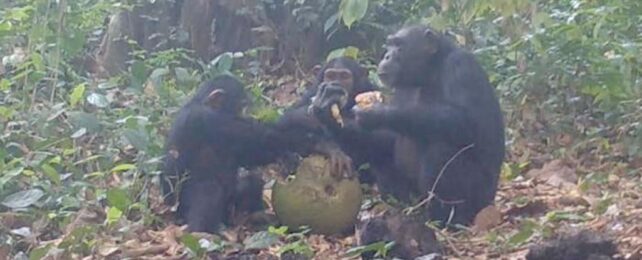Remote cameras in Africa have captured the first images and video of wild chimpanzees eating and sharing fermented fruit that contains alcohol.
Bonding over alcoholic drinks is an ancient human tradition, and this exciting discovery hints it might be even older – and less unique to us – than we thought.
The intriguing similarity observed in our closest living relatives suggests our history of alcohol consumption could date back to before our species existed.
"Sharing alcohol – including through traditions such as feasting – helps to form and strengthen social bonds," says first author and primatologist Anna Bowland, from the University of Exeter in the UK.
"So, now we know that wild chimpanzees are eating and sharing ethanolic fruits, the question is: Could they be getting similar benefits?"
Bowland and her colleagues from the UK, Canada, and the US studied western chimpanzees (Pan troglodytes verus) living in Guinea-Bissau's Cantanhez National Park.
These chimps are not habituated to researchers, so the study authors set up motion-activated cameras at three locations to record their natural behavior.
The footage revealed chimps not only feeding on fermented African breadfruit (Treculia africana), but also passively sharing it with one another. Testing later confirmed the specific fruits contained ethanol.
Humans have a long history of drinking and sharing alcohol, with evidence of deliberately fermented beverages dating back at least to Neolithic times, where it may have offered benefits related to social bonding like it does today.
Even before ancient humans figured out how to make alcohol themselves, they likely capitalized on what they found in naturally fermented fruits, just as these wild chimpanzees seem to be doing.
"For humans, we know that drinking alcohol leads to a release of dopamine and endorphins, and resulting feelings of happiness and relaxation," says Bowland.
It remains unclear whether chimps purposely seek out alcohol – and, if so, why.
Chimps were filmed sharing fermented fruits on 10 separate occasions, with the sharing occurring among 17 individual chimps – including members of both sexes and every age category.
This was mostly 'passive' sharing, in which a chimp who possessed fruit let others feed from it, but there was also one case of 'active-passive' sharing, in which a chimp let another chimp take some fruit from its mouth.
Chimps with fruit showed no apprehension about sharing, and there were no observations of chimps sharing their fruit under pressure.
Testing found that 90 percent of shared fruits contained ethanol at the time of consumption, with the content ranging from 0.01 to 0.6 percent alcohol by volume (ABV).
That's pretty low by human standards – beer is typically at least 4 percent ABV, while wine commonly falls between 10 and 15 percent, and liquor may be 40 percent ABV or higher.

But fruit constitutes the vast majority of a chimpanzee's diet, and since they seem to show a preference for riper fruits, wild chimps could end up consuming a significant amount of alcohol.
"Chimps don't share food all the time, so this behaviour with fermented fruit might be important," says University of Exeter biological anthropologist Kimberley Hockings.
They probably don't usually get drunk, a vulnerable condition few wild animals can afford, and the effect of alcohol on their metabolism is unknown.
The team points to previous findings that about 10 million years ago, a molecular adaptation in a common ancestor of African great apes "endowed our ancestors with a markedly enhanced ability to metabolize ethanol."
This coincided approximately with our ancestors' shift from arboreal to terrestrial lifestyles and may have been particularly valuable for life on forest floors – where older, riper, more fermented fruit is abundant.
Alcohol consumption thus seems to be older than humanity, since the genus Homo likely evolved within the last 3 million years, and our species only dates back about 300,000 years. Booze may have ancient roots not just for us, but also for closely related apes like chimpanzees.
"We need to find out more about whether they deliberately seek out ethanolic fruits and how they metabolise it, but this behaviour could be the early evolutionary stages of 'feasting,'" Hockings says.
"If so, it suggests the human tradition of feasting may have its origins deep in our evolutionary history."
The study was published in Current Biology.
